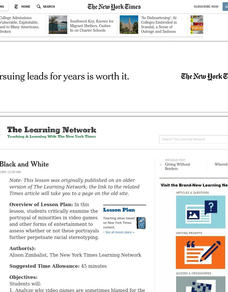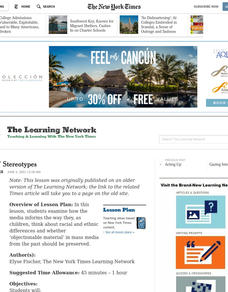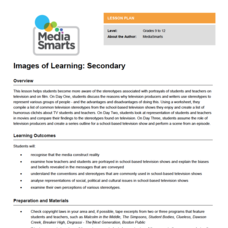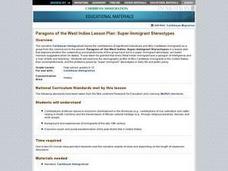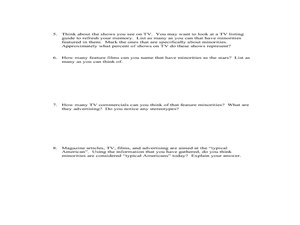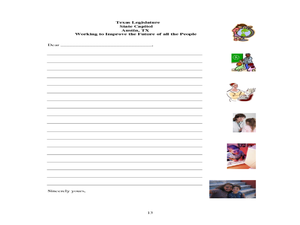National Endowment for the Humanities
Harriet Jacobs and Elizabeth Keckly: The Material and Emotional Realities of Childhood in Slavery
Young historians learn how to make generalizations based on primary sources in a instructional activity that uses the autobiographies of two women born into slavery. The class watches a historical re-enactment of scenes from the lives of...
Curated OER
Beyond Black and White
Students critically examine the portrayal of minorities in video games and other forms of entertainment and assess the role of racial stereotyping. They keep a log of media minority portrayals and respond to their findings.
Curated OER
Stereotypes and Cross-Cultural Understanding
Students are introduced to the topic of stereotypes. After reading an article, they complete a chart filling out the appropriate sections. They participate in a class discussion about how to eliminate as many stereotypes as they are...
University of the Desert
What Are the Possible Causes of Cultural Misunderstanding?
Why do cultural misunderstandings happen? What causes stereotypes, and what is dangerous about them? After viewing some possible explanations to these questions provided by young adults around the world, your learners will discuss how...
Curated OER
Sufferin' Stereotypes
Examine how the media informs the way your class thinks about racial and ethnic differences. Additionally, middle and high schoolers discuss whether "objectionable material" in mass media from the past should be preserved.
Curated OER
The Adventures of Huckleberry Finn: Socratic Seminar
After reading The Adventures of Huckleberry Finn and an article about the use of the novel, class members engage in a Socratic seminar focused on whether or not Twain's book should be banned.
Curated OER
Using Random Sampling to Draw Inferences
Emerging statisticians develop the ability to make inferences from sample data while also working on proportional relationships in general. Here, young learners examine samples for bias, and then use random samples to make inferences...
Texas Education Agency (TEA)
Geometry in Architecture #1
Discover how to analyze architecture from a geometric standpoint. The fourth installment of an 11-part unit on architecture first provides a presentation on axis, balance, basic form, formal, pattern, proportion, symmetry, and tripartite...
Curated OER
Night Lesson Plan: Stereotypes and Scapegoats
Students read the novel Night by Holocaust survivor Elie Wiesel and complete related activities. In this novel analysis lesson, students prompt write and discuss the answers. Students take notes on stereotypes and scapegoats and read how...
Curated OER
Stories of Individuals in the Chinese Community: a Comparative Approach
Students focus on stories describing the experiences of several individuals in the Chinese community and compare them with the experiences of Chinese immigrants in the late 20th century.
Curated OER
Women's Roles in World War Two
Students explore the various roles of women in the armed forces and their experiences at work. They discuss stereotypes of men and women during World War Two. They read extracts of stories from World War Two in small groups and report...
Media Smarts
Images of Learning: Secondary
Make your scholars more aware of stereotypical portrayals in film and television. Discuss the definition of "stereotypes" and how they are used to present a story. High schoolers look at specific television shows and complete a chart...
Curated OER
Fish Communities in the Hudson
Learning to read data tables is an important skill. Use this resource for your third, fourth, or fifth graders. Learners will will study tables of fish collection data to draw conclusions. The data is based on fish environments in the...
Teaching Tolerance
Using Photographs to Teach Social Justice | Exposing Homelessness and Poverty
Photos can capture a complete story in a single image. Class members closely examine a photo of a homeless camp and attempt to read the story told by the picture. They then read the caption for the photograph and compare their notes with...
Anti-Defamation League
Matthew Shepard and James Byrd, Jr., Hate Crimes Prevention Act
You, too, can prevent hate crimes! Middle and high schoolers read short biographies of Mathew Shepard and James Byrd, the two men for whom the Matthew Shepard and James Byrd, Jr. Hate Crimes Prevention Act (HCPA) is named. After learning...
Curated OER
Paragons of the West Indies Lesson Plan: Super-Immigrant Stereotypes
High schoolers examine the demographic profile of Afro-Caribbean immigrants to the United States, their accomplishments, and the problems posed by "super-immigrant" stereotypes in daily life and public policy. They read a narrative and...
Curated OER
Stereotype Lesson Plan
Students examine the concepts related to stereotypes. In this stereotyping activity, students define the word "stereotype" before working in a group to develop stereotype statements. They determine if the statements are fair. They work...
Curated OER
Racial Stereotypes in the Media
Students examine how stereotypes function in the media. They discuss the role and nature of stereotypes, watch a clip from the movie, 'Bend It Like Beckham,' and write a response paper about cultural representations in the movie.
Curated OER
Our Computers, Ourselves: Imagining the Digital Lives of Authors and Characters
The guiding question for this lesson is "Do computers and their contents shape who we are?" Open with a selection of Apple's commercials to introduce stereotypes and people's relationships with their computers. Then, read the attached...
Curated OER
Debunking Stereotypes About Muslims and Islam
Students consider the impact of stereotypes. In this Islam lesson, students discuss the attributes that Islam, Christianity, and Judaism have in common. Students also discuss stereotypes about Islam and determine how to dispel them.
Curated OER
Learning the Roles in Literature Circles
I love literature circles! Get your pupils together and have them discuss the book they are reading. They determine and practice their role in the literature circle then discuss the book they are reading. This is a great introduction to...
Curated OER
Minorities in Mainstream American Society
So many people fought for Civil Rights in the United States. Read about the Civil Rights Act of 1964, and discuss what the act guarantees. Then pass out a slew of magazines and encourage them to observe how often minorities appear in...
Curated OER
Women in Texas Politics: Winning the Vote, Three Pioneers, and Serving the People
Fourth graders study women's involvement in Texas politics. In this US history instructional activity, 4th graders discuss woman suffrage, examine three Texas female pioneer legislators by reading biographies, and explore women's issues...
Curated OER
Generalizations: How Accurate Are They?
High schoolers recognize and modify generalizations. They challenge generalizations made about people, insist on knowing the evidence that supports these, and be willing to modify their own generalizations when confronted by evidence...



